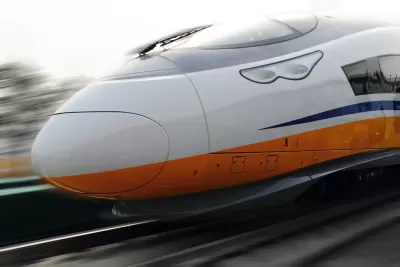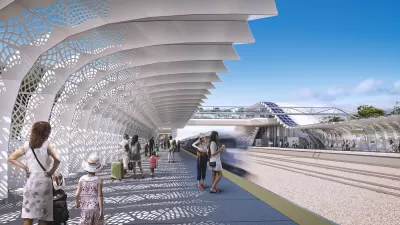The China Railway International Group, working with the Chinese Export-Import Bank, responded to the California High-Speed Rail Authority's "expressions of interest." They teamed up with China Development Bank to beat out the Japanese in Indonesia.

"A team of Chinese firms, along with the Export-Import Bank of China, wants to build and finance a large part of California’s proposed 800-mile high-speed rail project," writes Robin Respaut for Reuters. "The firms expressed their interest last month in a 23-page document sent to the California High-Speed Rail Authority."
China Railway International Group had responded to the rail authority's request to "private companies from around the globe to help shape the state's strategy to launch the first stage of its train line, considered the most ambitious infrastructure project in the United States," writes Respaut.
An Oct. 2 AP article by Juliet Williams indicates that the authority received responses from 35 companies (pdf) who are interested in building the controversial San Francisco to Los Angeles line.
The group may have a leg up on the competition as it "proposed financing from the Export-Import Bank of China."
According to China Exim's website, "The Bank's main mandate is to facilitate the export and import of Chinese mechanical and electronic products, complete sets of equipment and new- and high-tech products, assist Chinese companies with comparative advantages in their offshore project contracting and outbound investment, and promote international economic cooperation and trade."
On Friday, the chairman of the China Railway International Group also signed a $5.5 billion deal "to build the first high-speed railway in Southeast Asia's top economy," Indonesia, beating out Japan, according to an AFP article.
Seventy-five percent of the funding will come from the China Development Bank, "with the rest coming from the Chinese railway company and Indonesian consortium."
The line will connect the Indonesian capital Jakarta with the mountain-fringed city of Bandung, some 160 kilometres (100 miles) away, and is a key part of President Joko Widodo's plans to overhaul the archipelago's infrastructure and attract investors.
Japan was long expected to build the railway but China entered the contest earlier this year, and Tokyo's bid was rejected last month after a chaotic bidding process that infuriated the Japanese.
China Development Bank "could revolutionize development funding in the U.S.," as noted here in a 2012 post on funding a massive San Francisco development.
China Railway International also entered into an agreement last month with America's XpressWest Enterprises LLC, the company building the Victorville, Calif. to Las Vegas privately funded high-speed rail line.
However, Williams and Justin Pritchard throw some cold water on the California project, writing that businesses are questioning whether sufficient funding is available for the high-speed rail project.
FULL STORY: Chinese firms want to build, finance California high-speed train

Alabama: Trump Terminates Settlements for Black Communities Harmed By Raw Sewage
Trump deemed the landmark civil rights agreement “illegal DEI and environmental justice policy.”

Study: Maui’s Plan to Convert Vacation Rentals to Long-Term Housing Could Cause Nearly $1 Billion Economic Loss
The plan would reduce visitor accommodation by 25% resulting in 1,900 jobs lost.

Why Should We Subsidize Public Transportation?
Many public transit agencies face financial stress due to rising costs, declining fare revenue, and declining subsidies. Transit advocates must provide a strong business case for increasing public transit funding.

Wind Energy on the Rise Despite Federal Policy Reversal
The Trump administration is revoking federal support for renewable energy, but demand for new projects continues unabated.

Passengers Flock to Caltrain After Electrification
The new electric trains are running faster and more reliably, leading to strong ridership growth on the Bay Area rail system.

Texas Churches Rally Behind ‘Yes in God’s Back Yard’ Legislation
Religious leaders want the state to reduce zoning regulations to streamline leasing church-owned land to housing developers.
Urban Design for Planners 1: Software Tools
This six-course series explores essential urban design concepts using open source software and equips planners with the tools they need to participate fully in the urban design process.
Planning for Universal Design
Learn the tools for implementing Universal Design in planning regulations.
Caltrans
Smith Gee Studio
Institute for Housing and Urban Development Studies (IHS)
City of Grandview
Harvard GSD Executive Education
Toledo-Lucas County Plan Commissions
Salt Lake City
NYU Wagner Graduate School of Public Service





























